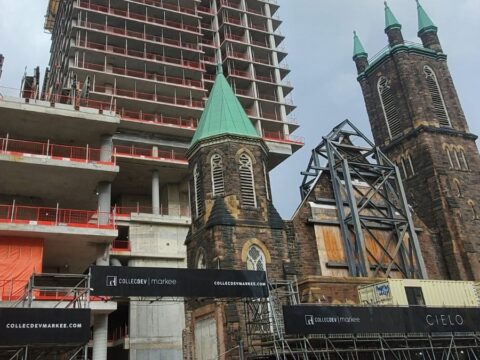Five years after The United Church of Canada underwent a monumental restructuring, the denomination is looking into how well the new church is working.
The changes went live in January 2019, replacing the governance model that had existed since 1925. Eighty-eight presbyteries and 13 conferences turned into 16 regions. General Council remained in place as the overall governing body, though the voting members on the General Council Executive were reduced from 50 to 18 and are now elected by General Council, not appointed. All of this was intended to trim finances and create a more adaptable church.
You may unsubscribe from any of our newsletters at any time.
Cheryl-Ann Stadelbauer-Sampa, a senior governance support lead at the General Council office who is staff support for the review, says one of her dreams for the review is to discern where people have directed the time and energy they once gave to church administration.
“I don’t want us to lose what structural change might have made possible,” she says.
With the exception of Indigenous representatives who are yet to be confirmed, the steering committee has been finalized and met for the first time this spring. Stadelbauer-Sampa confirms that the evaluation will consist of two key elements: an assessment of the success of the structural change’s goals, including financial stability, the speed of decision-making, and the need for fewer volunteers; and a broad consultation, particularly regarding relationships between the regional councils.
“We’re working to a timeline to have something ready to take to the General Council Executive early in 2025, with a view to be able to share it with the General Council in the summer of 2025,” she says.
Broadview’s 2022 review of the restructuring reported that the United Church’s nimbleness in responding to the COVID-19 pandemic demonstrated that the new model is “faster to adapt,” but it was still “a work in progress.”
More on Broadview:
-
Crossroads United steps up to save Kingston’s sleeping cabin program
-
Misunderstandings, understaffed congregations bogged down votes in Indigenous United Church remit
- I grew up in an evangelical church. Now I’m a 2SLGBTQ+-affirming minister.
One United Church minister isn’t a fan of the new setup.
“I don’t know anybody who thinks that the new governance structure has been successful,” says Rev. Alison Miculan, who is currently the minister of two rural congregations in southern Ontario and the organizing chair of Unifaith, a community chapter of Unifor that hopes to unionize United Church clergy and staff.
“In fact, I think that most of us are feeling that it has completely undermined the conciliar process of the denomination — and the conciliar church is how we define ourselves.”
Stadelbauer-Sampa says that clusters are beginning to form organically among churches that are geographically close to one another. But she is aware that there has been a gap in that development, partly due to the pandemic which struck while the restructuring was still fresh.
“People have talked about feeling isolated,” she says, but in her observation, they “haven’t always embraced the opportunities to connect.”
But for Miculan, it’s not that simple.
“As a church, we really value robust debate and discussion,” she says. That happened at Presbytery and Conference, but “it does not happen at regional meetings.”
Stadelbauer-Sampa also says that many regional councils are struggling to find volunteers to hold elected positions. Some of these roles would give people the chance to participate in decision-making — something some feel was lost with the elimination of presbytery.
But Miculan is also uneasy about the nature of the review itself.
“I think we need to be extremely concerned that this is going to be a review that is damned to succeed,” she says.
Confirmed review steering committee members include a mix of laypeople, ordained ministers and Pacific Mountain Region executive minister Treena Duncan.
Some also take issue with the fact that a General Council office staffer is leading the review. Retired minister Rev. A.H. Harry Oussoren told Broadview in an email that he was concerned about how Stadelbauer-Sampa would be able to pass a “‘conflict of interest’ smell test.”
Stadelbauer-Sampa says that she was on a team tasked with looking at how the remits that governed the church’s restructuring would be carried out. She is also a former regional council executive minister.
“That experience means I am familiar with the intentions and the challenges of structural change,” she told Broadview via email.
But she rejects the notion that she is in a conflict of interest. Her decision to take on the role was due in part to it being a limited-term contract ending in December 2025, coinciding with her plans to retire.
That enables her to be engaged in the project “with the benefit of the distance of not continuing in a specific role post-project,” she says.
***
Leslie Sinclair is a freelance journalist in Toronto.















A great article highlighting just the tip of the iceberg with the new structure and its employees.
Stadelbauer-Sampa claims the evaluation looks at the need for fewer volunteers then claims that Regional Councils are struggling to find volunteers. Two problems… the Regional model now simply makes paid positions instead of volunteers which has disincentivized volunteerism along with making volunteer positions ones people have to apply for; the second problem is the obvious – if the Reegion needs less volunteers then how are they having difficulty finding volunteers for roles?
The problems Stadelbauer-Sampa names, namely people being isolated and feeling like they cannot participate in decision-making is caused by the power-abuse of Regional Staff being a highly protective and selective clique. Challenges to decisions or thinking are seen as challenges to authority instead and treated with punishments such as letters left in people’s “files” or threats of “effectiveness reviews” done by the Office of Vocations. Problems like what Oussoren points out are not isolated, this happens consistently within the Regional Councils and General Council Executive levels. A review does not go far enough. We (the denomination) were told this switch would lower costs and cut red tape, it has done neither after nearly five years. In my Region we started off with four Regional (paid) staff, we’ve more than doubled that – and these salaries are not small either. Yes, clusters are forming organically because of the ineffectiveness of Regional Staff and Council as a whole to get the job done – these clusters have had NO CHOICE but to form.
Perhaps the lack of volunteers at the Regional level is distance? I would travel within my (former) Presbytery but the Region is much too big for me, especially in the seasons other than summer. Weather and darkness are a big factor as well as my own limitations.
In terms of the United Church structural review, it may help to name it an internal and not an external institutional review.
John Oussoren, Crystal Lake, Sask.
In my experience Presbytery in recent years was a costly semi-annual social club, which refused to address actual issues — such as violation of the three-party Ministerial Covenant by Presbytery itself.. From a financial standpoint, our CoF pays much less under the fairer National Assessment model than we did to Presbytery. Basing payment previously based on expenditures never made sense. I voted enthusiastically from the four to three court change.
If increasing (or even maintaining) our collective capacity to be faithful national, regional and local Communities of Faith was not a goal of the restructuring, the review won’t assess for that. I miss presbytery meetings as places where the community could hear itself face to face on faith issues on a frequent basis and have what felt like meaningful input into the discussion at all levels.
Perhaps such regular consultation was a luxury of being a larger, more affluent church, but I don’t think so. Have we perhaps exchanged fuller (i.e. messier and slower) exchanges for “nimbleness” (i.e. more direction by small numbers of volunteers and/or staff and less concern for building a church-wide consensus)?
Perhaps those charged with the review can figure out a way to listen for thoughts on this aspect of our shared life.
I completely agree with Rev. Harry Oussoren’s comments about the “smell test” – having Stadlebauer-Sampa, someone who greatly benefitted from the restructuring in terms of power, influence, reach, and control of decision-making (as did handpicked people she brought along with her to the new structure), review the new structure (which really DOES smell), smells like the liquified manure they spread on the fields out here in Haldimand County. And that is very bad indeed. The United Church of Canada General Council Executive thinks no one is noticing or watching, but we are.
The Executive General Council suffers from the sin of omitting our lord and saviour the living Jesus Christ in their decisions, since 2019 and before.
Ephesians 6 10-18. put on the full armour of God, so that you can take your stand.
Dear Father, thank you for reminding me in Scripture how I can stand against the devious ones’ attacks on our personal and collective faith in You and Your beloved Son.